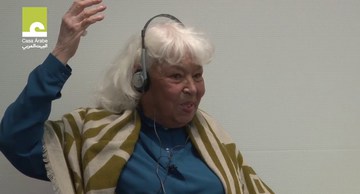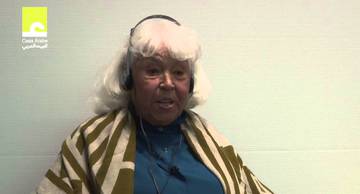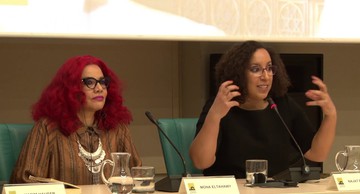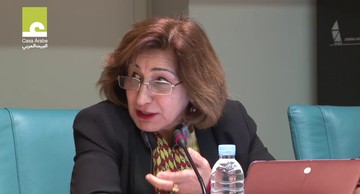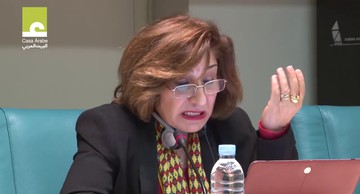Mujeres


Football Is a Girls’ Game: A meeting with three Arab women in football
Publicado el 10 de octubre 2022
TODOS LOS VÍDEOS DE ESTA CATEGORÍA
-
Feminismos en el mundo árabe
Casa Árabe y la Fundación Tres Culturas organizó una conversación a cuatro voces con Nawal El-Saadawi (Egipto), escritora y militante feminista; Wassyla Tamzali (Argelia), especialista en temas de género; Nieves Paradela (España), profesora de la Universidad Autónoma de Madrid y Eva Lapiedra (España), es profesora de la Universidad de Alicante. La mesa redonda analizó la evolución de los movimientos feministas en el mundo árabe desde las últimas décadas del siglo XX, con especial referencia a los casos de Egipto y Argelia. Se abordará también la situación actual de la lucha por los derechos de las mujeres, tras la evolución de los movimientos sociales y civiles en los últimos cinco años y la compleja situación que viven muchas sociedades árabes actuales.Publicado el 31 de marzo 2020 -
Feminisms in the Arab world
Casa Árabe and the Tres Culturas Foundation held a four-voice conversation with Nawal El-Saadawi (Egypt), a writer and feminist militant; Wassyla Tamzali (Algeria), a specialist on gender-related topics, Nieves Paradela (Spain), a professor at the Universidad Autónoma de Madrid, and Eva Lapiedra (Spain), a professor at the University of Alicante. This round table discussion analyzed the changes and developments in the Arab world’s feminist movements as of the final decades of the twentieth century, with a special focus on Egypt and Algeria. It also dealt with the current situation in the fight for women’s rights, after developments in the social and civil movements over the last five years, coupled with the complex situation through which many of today’s Arab societies are living.Publicado el 31 de marzo 2020 -
Feminisms, religion and secularism (ENGLISH)
On Tuesday, March 26, there was a new session in our series titled “Dialogues on Open Societies,” given by journalist and writer Mona Eltahawy, along with fellow writer Najat el Hachmi. Presented by Karim Hauser, Casa Árabe’s Coordinator of International Relations. Reports from different international entities coincide in ranking the countries of North Africa and the Middle East amongst the worst in terms of gender equality. Though the situation differs by country, and in certain cases the Law has moved ahead considerably in guaranteeing rights on paper, the unrest which began in 2011 has not achieved the inclusion of women in public life under conditions of equality with men, and many consider themselves second-class citizens. Perhaps Tunisia could be named as a unique case where the triumph of protests has led to an improvement in women’s status. Through their activism, many Arab feminists question the oppressive mix of politics, cultural habits and religion which permeates every layer of society, and they continue fighting to make their voices heard, both inside and outside the region. Mona Eltahawy, who authored "Headscarves and Hymens", and Najat el Hachmi, the author of "The Last Patriarch", met at Casa Árabe to discuss this problem and call out to demand gender equality. The event included the participation of the publishing firm Capitán Swing and the Barcelona Contemporary Culture Center (Centre de Cultura Contemporània de Barcelona, CCCB). Mona Eltahawy is a columnist and international analyst of the subjects of Arabs, Muslims and feminism. She was a correspondent for Reuters in the Middle East for six years and has worked for the media in several countries in the region, and in China. She is currently collaborating with media such as the New York Times and The Guardian. She is a member of the Communications Consulting Group Musawah, the movement for justice and equality in the Muslim family. She has received a wide range of awards and acknowledgments for her work as a journalist, and Time magazine named her a “person of the year” along with other activists from around the world. She is the author of the book Headscarves and Hymens: Why the world needs a sexual revolution. Najat el Hachmi was born in Morocco after her father had already emigrated to Catalonia. At the age of eight, she moved to the town of Vic. She earned her undergraduate degree in Arabic Philology from the University of Barcelona. She has been writing since she was eleven years old, in the beginning as a form of entertainment, but little by little writing grew into a way for her to channel her thoughts about feeling like she was from two places at once, and a way to bring these two worlds to which she belongs closer together. In 2004, her book Jo també sóc catalana (I Am Catalan, Too) was published. She appears as a guest speaker on the radio and has articles published in the written press. Her work The Last Patriarch was bestowed with the Ramon Llull Award of 2008 and the Ulysse Award for a first novel in 2009, and she was a finalist for the Prix Meditérranée Étranger in 2009. The series “Dialogues on Open Societies” is an initiative of Spain’s Ministry of Foreign Affairs, the European Union and Cooperation with the cooperation of Casa Árabe, co-directed by Doménec Ruiz Devesa, Advisor for the Cabinet of the Ministry of Foreign Affairs, the European Union and Cooperation, and by Pedro Martínez-Avial, the General Director of Casa Árabe. More info: http://en.casaarabe.es/event/“dialogues-on-open-societies”-series-of-conferences#14462Publicado el 31 de marzo 2020 -
Gender, minorities and refugees in Iraq (ARAB)
Pascale Warda, Iraq’s former Minister of Immigration and Refugees, gave this conference in Casa Árabe in Madrid. Since the first Gulf War, there have been various waves of refugees and internally displaced persons in Iraq. They now amount to nearly 3.5 million, of which 2.5 million came about in 2014 alone. Iraqi sources estimate that over 4 million people have lost their homes and have become internally displaced, including the unregistered internally displaced. Moreover, since June 2014, thousands of people belonging to minority groups have been murdered, maimed or kidnapped, including an unknown number of women and girls forced into marriage or sexual slavery. These abuses continue and seem to be part of a conscious attempt to eradicate Iraq’s religious and ethnic diversity. These violations are not only being committed by the Jihadists in Daesh. Given by: Pascale Warda, Iraq’s former Minister of Immigration and Refugees. Including the intervention of Ana Gil, a journalist and author of the book “Una rosa en Irak” (“A Rose in Iraq”). The event was presented by Karim Hauser, who is responsible for the Governance Area at Casa Árabe. More info: http://en.casaarabe.es/event/gender-minorities-and-refugees-in-iraqPublicado el 31 de marzo 2020 -
Género, minorías y refugiados en Iraq (ESP)
Pascale Warda, ex ministra de Inmigración y Refugiados de Iraq impartió esta conferencia el 12 de enero de 2017 en la sede de Casa Árabe en Madrid. Desde la primera Guerra del Golfo, ha habido diversas oleadas de refugiados y desplazados internos en Iraq, que suman ya cerca de 3,5 millones, de los cuales 2,5 millones sólo en 2014. Fuentes iraquíes estiman que más de 4 millones de personas han perdido sus hogares y son desplazados internos, incluyendo a los desplazados internos no registrados. Además, desde junio de 2014, miles de personas pertenecientes a minorías han sido asesinadas, mutiladas o secuestradas, incluyendo un número desconocido de mujeres y niñas forzadas al matrimonio o a la esclavitud sexual. Estos abusos continúan y parecen ser parte de un intento consciente de erradicar la diversidad religiosa y étnica de Iraq. Estas violaciones no provienen únicamente de los yihadistas de Daesh. La conferencia corrió a cargo de Pascale Warda, exministra de Inmigración y Refugiados de Iraq, y contó con la intervención de Ana Gil, periodista y autora del libro “Una rosa en Irak”. El acto fue presentado por Karim Hauser, responsable de Gobernanza de Casa Árabe. Más información: http://www.casaarabe.es/eventos-arabes/show/genero-minorias-y-refugiados-en-iraqPublicado el 31 de marzo 2020

